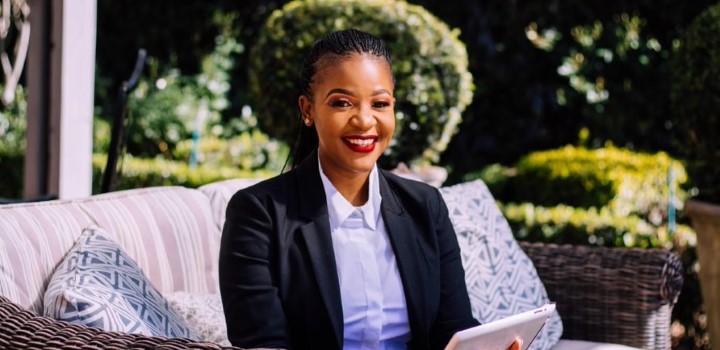Working from home? Dr Tshidi Gule shares a few coping tips

Much of the country’s workforce has had to swiftly transition from their office-bound desks to their homes during the current COVID-19 containment period. With so much ‘up in the air’ at present, how can employees better navigate this uncertain period? Dr Tshidi Gule shares a few pointers.
How do employees and employers grapple with staying productive and managing the disruptions to the workplace?
Tshidi Gule is a qualified medical doctor, founder of MediSpace Lifestyle Institute, corporate consultant, employee wellness strategist and author of the book ‘Rough Diamond’. Recently she has been in contact with many individuals on both sides of the professional arena – employers and employees.
Understandably, people are fearful and anxious. A health crisis such as the COVID-19 pandemic has many knock-on effects. How can employees better cope during the days of this active pandemic that requires people to adjust and even exercise compromise in their lives?
The effect of abrupt adjustments
For many working professionals, what we do for a living is very much tied to our sense of identity. With our usual working environments and structures shifting so dramatically, this can be a shock to our system. Abrupt changes naturally have this effect.
For many, having to transition without much warning or time to prepare has been tough, and has perhaps taken some time to settle into a new rhythm. Anyone now working from home has needed to adjust to a new environment – blending their personal lives with their working ones – something that isn’t easy to get used to overnight.
For many, the home is a place of rest – a sanctuary. It’s not a place where work activity is typically predominant. It’s a place to dedicate to our personal lives and those we love. Now, it needs to co-exist with work schedules and associated expectations. Co-workers and employers now, to some extent, exist within these restful, personal spaces for many hours each day. This window into all of our personal lives in itself is an adjustment for many people.
Coping with a more restrictive existence
The word ‘lockdown’ started it all and brought on the dramatic change we’re all now living through. This strict containment action is now in place as a protective measure, which is good, but it doesn’t necessarily prevent anxiety or even panic.
“A lot of employees naturally went into a panic,” says Dr Gule. Being restricted so drastically has had this effect on many. It comes with uncertainty, fear and anxiety. This leaves people feeling sensitive and emotional. We may be protecting our physical health with these strict stay-at-home measures, but we then have to find ways to better cope with the emotional side – the other side of the same coin.
The restrictive nature is unsettling to our normal rhythm. All of us now need to adjust to a new routine with mobility being heavily restricted. For working professionals, “you’ve got to figure out a way to produce results at home,” Dr Gule adds.
Creating a new work environment
Creating an effective work space is one of the biggest challenges all working professionals are coming to terms with now. The challenge is not necessarily the same for everyone. Home to one person is different for another. Dr Gule cautions that people shouldn’t assume that the solution to this challenge is the same for everyone.
Some have limited space to work. Others have shared spaces with individuals all needing to fulfil certain requirements – for work, school work or even just personal use. It’s not as simple as ‘creating an office environment at home’ for everyone. Not everyone has a desk or a study to use for office work. Some will merely have a couch that they can use. For many that same couch may need to be shared with family or housemates.
“Trying to create a work space that allows you to almost simulate your office environment is the first challenge. A lot of people have been getting creative around it. So, it’s been good to see that there’s been a lot of positive spin on how to be productive at home,” adds Dr Gule.
Developing a structured way to work
“The real thing for an employee has been really creating structure at home – creating a routine that is practical and manageable and realistic.”
Some individuals live alone, some with adult family members, and others live with children ranging in age, or with peers or friends. For parents, in particular, added challenges involve more responsibility. With schools closed, they’re having to spend more time coordinating their children’s day, managing school work and picking up some responsibility they didn’t have to previously with teachers on hand. There’s a degree of anxiety about this too – how do you manage schooling and downtime in a household and still be a dedicated and productive employee for the time you need to be?
Dr Gule recommends taking each day at a time and navigating your way through it until you find a system that works. Each household will need to figure this out individually – and at their own pace. New routines are needed and ones that are considerate of each other.
Our normal habits were structured around certain cues, such as making our way around during periods of peak traffic and sitting at a desk in an environment away from our homes. Now these cues aren’t part of our day. ‘Habitual programming’ has changed. “Now, we’ve stripped them away, and it’s like there’s this looseness that we’re now struggling to negotiate,” says Dr Gule.
“The pattern of going to work is programmed into your mind – your mind actually goes into a gear. So, you gear up and you gear down, depending on what time of day it is. And now you’re at home, so you’ve got to almost gear yourself up and you’ve got to gear yourself down. So you can imagine for the brain, this is a huge leap without that stimulus.”
“Nevertheless, your brain is also wired to learn a new habit. So, I think it’s really important to look on the positive side here. If you retain a structure … if you retain a routine – as simple as what time you wake up – if you keep that routine of when you wake up to go to work and you wake up to go to work at home, you actually help your brain retain that information, and actually retain those cues that keep you productive,” she explains further.
It is possible to adjust and develop a new routine that can be effective during this time – not only create it, but also sustain it for as long as will be needed. “You’ve got to start. You’ve got to try. Not starting does not help you in this scenario,” she adds.
Steer clear of panic decisions
Employees and employers are all in unchartered territory today. Worry is all around. While employers grapple with new and improved ways to remain in business, employees may be worried about job security and their own financial wellbeing.
This is entirely understandable. The economic impact of this health crisis will surely be significant – no one doubts this. This will have repercussions and consequences, where many will feel the impact directly. The fear is warranted.
It’s important for employees to keep in mind that many of their own questions may be on the minds of their employers too. Some employers may not yet have the answer an employee needs just yet. Be patient and trust that no one wishes for the worst to happen. There is risk involved and those capable of identifying solutions are surely already working hard to figure out how to keep the ship afloat and intact once the worst of this pandemic is over.
In the short term, the ride will be bumpy – “Our economy is going to feel the weight of this pandemic, and it is likely going to be affected negatively in the beginning and then it will stabilise,” says Dr Gule.
Therefore, it’s important for employees to try and refrain from decisions that are motivated by panic. It’s not the wisest approach right now to try and cash in retirement or pension funds. Hang in there – keep them. Much could change within the next few weeks or even three months.
The nature of a viral outbreak is that it typically gets worse fairly quickly and then, with a little proactive effort, things stabilise. The natural cycle of COVID-19 will run its course and the worst will pass.
“Science is very predictable – in studying something, getting on top of it, preventing it, curing it. And we are already in that place of trying to stabilise what’s happening. So, it’s important not to use COVID-19 as a defining moment of our financial wellbeing,” says Dr Gule.
All medical information found on this website including content, graphics and images, is for educational and informational objectives only. Discovery Health publishes this content to help to protect and empower all South Africans by promoting a better understanding of COVID-19.
Find a healthcare professional near you
Find a doctor or hospital near you online or by using the Discovery app.
Related articles

Outbreak of the 2019 novel coronavirus
The 2019 novel coronavirus (2019-nCoV) has caused an outbreak of fatal respiratory illness first detected in Wuhan, China. This is a completely new strain with no vaccines available. The best way to prevent infection is to avoid being exposed to this virus.

A fierce flu season is expected: immunising early is the best defence
One of the best ways to be mindful of your own and others' health this March is to protect against, and prevent the spread of, the frighteningly contagious influenza virus. Here's why getting immunised early offers you the best defence.

Feeling the flu? Why and when to taper back on training
Feeling under the weather? There's a reason doctors always prescribe rest when you're ill. Here's how to be mindful of your body's needs, plus an easy way to earn 1 000 Vitality points for keeping the flu at bay with a flu vaccination.